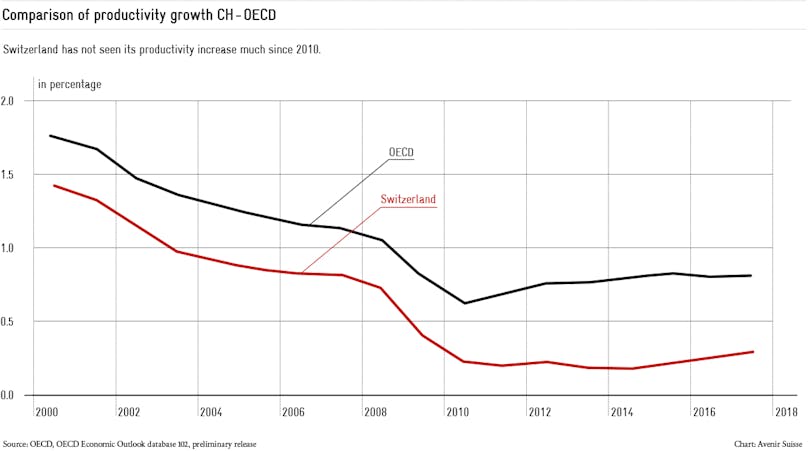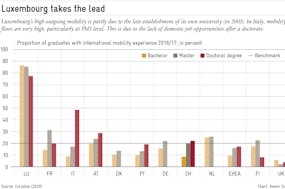The recommendations made by the Organization for Economic Co-operation and Development (OECD) are not always received positively. Nonetheless, the institution has an essential advantage: it analyzes Switzerland and its economic policy with an outsider’s perspective. This is why their analysis and suggestions should be taken very seriously and not ignored. It is important to use their external and substantiated perspective constructively because, in the same way as companies, states too can suffer from a form of operational blindness.
The same primary diagnosis
The Economic Survey of Switzerland (OECD Economic Surveys: Switzerland November 2017), published on November 14 of this year, contains many recommendations that are also present in the list of proposals made by Avenir Suisse. The consensus is present from the start in the primary diagnosis: the OECD confirms the exceptionally high level of prosperity in Switzerland, measured in terms of income per capita adjusted for purchasing power. It also believes that this situation is threatened due to a weak productivity growth; one of the lowest among all OECD countries. The OECD also noted the high percentage of women working part-time and the stagnation of employment of Swiss natives in the labor market. Like Avenir Suisse, the OECD considers that it would be unwise to rely solely on immigration.

Measures to increase productivity
We would like to further highlight the consensus between the OECD and Avenir Suisse vis-à-vis their recommendations on how to increase productivity growth:
- diminution of obstacles when entering the market, liberalization and privatization in the sectors of energy, telecommunications and transport;
- privatization of Swisscom is a priority;
- elimination of state guarantees in cantonal banks in order to reduce risks of sovereign or political nature;
- diminution of obstacles for cross-border trade in goods and services, particularly in the agricultural sector;
- diminution of agricultural subsidies (direct payments);
- closure of the negotiations on free-trade agreements with Asia and Mercosur ;
- elimination of bureaucratic obstacles for start-ups.
How to deal with the workforce shortage?
The OECD still diagnoses a persistent shortage of skilled and highly skilled workers, partly because the female employment potential is underexploited. Similarly to Avenir Suisse, the OECD suggests:
- introducing an individual taxation in order to eliminate negative work incentives for married women;
- improving the reconciliation between work and family life, an area where Switzerland is still lagging behind;
- reducing costs for external childcare services;
- simplifying the recruitment of workers from countries outside the EU and EFTA area, by increasing quotas and lowering obstacles (national preference).
Regarding education policies, the OECD recommends strengthening the scholastic component (general knowledge) in vocational education, as well as the link with practice in higher education institutions. The permeability between vocational education and the academic program needs to be improved. In order to further enable innovative SMEs to train apprentices, creating more vocational training networks is essential.
To ensure the financial security of the retirement provision, the OECD, like Avenir Suisse, suggests linking the retirement age to the evolution of life expectancy and hence to depoliticize it. Moreover, in order to preserve the employability of older workers, it is essential to improve work incentives close to the end of their professional career and to strengthen health promotion within companies.
Overall, the OECD report is very similar to Avenir Suisse’s program. This is quite interesting, given that the OECD’s reputation is not generally that of a liberal organization, as is the case for Avenir Suisse. But then again, it is precisely from an external perspective and beyond any ideological differences that many issues become obvious and urgent, despite their controversial nature for Switzerland; a country that remains reluctant to reforms.




